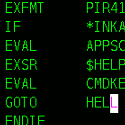|
comedyblissoption posted:also a bunch of the windows development toolchain cannot deal with paths > ~255 characters I had a .NET project that hit this limitation. curious how visual studio handled this? the answer is not well.
|
|
|
|

|
| # ? May 16, 2024 02:47 |
|
tef posted:this is why python stuffs them into itertools, so that every user list type only need return a generator over implement 30+ methods for each specific type of iteration combination the STL's way of organizing things never clicked with me until i used python, oddly enough.
|
|
|
Xarn posted:I am paid to code for AWS lambda (that means Python 2.7 only)
|
|
|
|
|
cinci zoo sniper posted:you can "hack" your way into python 3 there iirc I think Ive even read you can get anything that runs on aws linux in there, but that seems like a good way to get into the terrible programmers/coding horrors threads.
|
|
|
|
This is kind of just bitching apropos of nothing, but as someone just writing janitorial scripts, I find Perl's syntax insanely frustrating. I literally am coding a hobby project in C++14 at home for fun and I find that infinitely more intuitive and readable. What the gently caress is this poo poo? @{${hashOfTurds{$turdKey}}} I know what it does, of course. The fact that there's a parade of alternate ways to say that is, if anything, a strike against the language. It is just bizarre to me that someone would be interested in making a language that reads so terribly.
|
|
|
|
perl really should be understood in its historic context though, it amalgamated a lot of existing stuff (awk, sed, bourne shell stuff) and can be argued as being first in its category much like python3000 the perl6 thing makes no sense whatsoever, since no one used perl with a clean slate and all options open, it was always a bit of a bucket of legacy stuff which is great if you are trying to do something already mired in legacy unix'y string mangling and cpan dependencies
|
|
|
|
if you think of perl as the lower UTF-8 characters combined with mandarin chinese it makes a lot more sense.
|
|
|
|
this complaining requires the reposting of the vandor xml parser of kx k, used in production, all a very serious language of little hobbyist interest (our own Internet Janitor aside): https://a.kx.com/a/k/examples/xml.k a lot of k looks like that
|
|
|
|
Cybernetic Vermin posted:this complaining requires the reposting of the vandor xml parser of kx k, used in production, all a very serious language of little hobbyist interest (our own Internet Janitor aside): https://a.kx.com/a/k/examples/xml.k jesus christ
|
|
|
|
Cybernetic Vermin posted:this complaining requires the reposting of the vandor xml parser of kx k, used in production, all a very serious language of little hobbyist interest (our own Internet Janitor aside): https://a.kx.com/a/k/examples/xml.k is that perl ?
|
|
|
|
no, kx k, an apl descendant used primarily in the financial industry
|
|
|
|
any recommendations for books or online resources for a 14 year old learning programming with javascript? something less heavy than a college intro textbook, but not patronizing stuff for kids either? i just read reference manuals and api docs these days, i'm not sure where to point a new programmer. i'm guessing something online/interactive that guides you toward proper software development, where you actually understand what's going on and not just copy-paste the magic, but without getting too formal about things
|
|
|
|
JewKiller 3000 posted:any recommendations for books or online resources for a 14 year old learning programming with javascript? something less heavy than a college intro textbook, but not patronizing stuff for kids either? i just read reference manuals and api docs these days, i'm not sure where to point a new programmer. i'm guessing something online/interactive that guides you toward proper software development, where you actually understand what's going on and not just copy-paste the magic, but without getting too formal about things whjy are you posting in the POS if you are fourteen??!!!
|
|
|
|
also teach them python not js
|
|
|
|
Cybernetic Vermin posted:no, kx k, an apl descendant used primarily in the financial industry why would anyone ever use that
|
|
|
|
js is cool to teach kids because it's right there in the browser and that's l337 as poo poo
|
|
|
|
K is similar to J, which seems to be primarily motivated by a concern that APL was too readable.
|
|
|
|
fart simpson posted:why would anyone ever use that very fast, deeply integrated with an in-memory (or mmapped disk) database (from k4 on tables are a first-class type, behaving as both an array of records and a map from the key to the record), very straightforward ipc also it is way easier to learn and work with than appearances suggest: the way simple type/data model (and a functional style) makes understanding interfaces easy, there are a lot of operators but their use and the syntax is very orthogonal. the tendency is to use the trivial ipc and insane compactness to keep each service very small, keeping most of it right in front of your eyes a lot of the time i mean, if i ran a company i wouldn't have anyone write k (cumbersome java for all, everywhere), but i personally really enjoy it and it has some interesting points
|
|
|
|
Cybernetic Vermin posted:very straightforward um ok ill take your word for it
|
|
|
|
fart simpson posted:why would anyone ever use that APL is super expressive. K is said to be fast, but I haven't been able to figure out why (except that the interpreter is tiny).
|
|
|
|
Arcsech posted:which means lots of context-switching which fucks your cache (which is important for heavy-duty number crunching type libs)
|
|
|
|
Athas posted:APL is super expressive. its all in memory columnstore, which e.g. sql server has only gained recently. it's also really optimised for write only time series use case i think
|
|
|
|
K's performance with CSV files is impressively bad. The column store is more of a gimmick for time series data, there are many instances when KDB is just not good at all.
|
|
|
|
pointsofdata posted:its all in memory columnstore, which e.g. sql server has only gained recently. it's also really optimised for write only time series use case i think Fortran stores arrays column-major, even when it was still called FORTRAN. Maybe my problem is that I'm coming at this from functional high-performance-computing, where things like loop fusion are the key, and K is more about good IO performance.
|
|
|
|
JewKiller 3000 posted:any recommendations for books or online resources for a 14 year old learning programming with javascript? something less heavy than a college intro textbook, but not patronizing stuff for kids either? i just read reference manuals and api docs these days, i'm not sure where to point a new programmer. i'm guessing something online/interactive that guides you toward proper software development, where you actually understand what's going on and not just copy-paste the magic, but without getting too formal about things I dunno, I've seen the results of stuff like https://nodeschool.io and other js resources and been rather underwhelmed with the approach they take, way too much glossing over things to get to the practical results, that they almost implicitly assume someone is going to fill in the fundamentals. and for some people the fundamentals are of critical importance. that said, I'm a big fan of How to design Programs -- http://www.ccs.neu.edu/home/matthias/HtDP2e/part_prologue.html -- but I'm unsure whether that straddles the balance you're looking for correctly. Simply working through the prologue with Dr. Racket should be beneficial for the fundamentals, I feel it does a pretty decent job of explaining itself and the concepts.
|
|
|
|
Athas posted:Fortran stores arrays column-major, even when it was still called FORTRAN. Maybe my problem is that I'm coming at this from functional high-performance-computing, where things like loop fusion are the key, and K is more about good IO performance. nah, the only actual io that is quick in k is memory mapping tables (maps of vectors). the guy complaining about csv performance above is not wrong, it is not its forte at all to fiddle around in arbitrarily formatted files the basic performance case for k is not that it is ever winning an apples-to-apples comparison, where you go all-out vector libraries in some other language. it has a ton of operators though, all on vectors by default, many seemingly very powerful, but largely all very quick and tightly implemented. the same with the library (the sql dialect maps very thinly onto a few powerful operators which you can freely use yourself on vectors) and overall practices. is the case pretty much everywhere, stuff like the ipc is very raw the-standard-representation-onto-the-wire-in-tight-c stuff for example. so more about always getting the "apples" version of the program as long as you don't go out of your way to mess stuff up the interpreter being tiny may also help, but in the typical k program the interpreter is going to be executing relatively few operations compared to the number of cpu ops they represent it may now sound like it is mostly like just using every numpy op you can find when writing python, but the operators/library/runtime are more flexible (or, rather, more convenient to use in a flexible way), making it easier to e.g. do symbolic stuff or seemingly branch-heavy tasks
|
|
|
|
If anyone's genuinely curious about K, I suppose it might be appropriate to plug the APL/J/K thread again. As of a few months ago I'm actually a professional K programmer now. At the company I work for it's used for everything from deployment automation and expression parsing to web scripting and distributed databases. Even after spending some time wading through and cleaning up real-world K codebases, warts and all, it remains one of my favorite languages. Though it may seem implausible, it does become quite readable with practice. When you're used to K, more conventional languages often feel needlessly verbose and clumsy.
|
|
|
|
Internet Janitor posted:If anyone's genuinely curious about K, I suppose it might be appropriate to plug the APL/J/K thread again. code:
|
|
|
|
fart simpson posted:
i mean, people poo poo on me for being able to read idiomatic mumps too, but when you do it all day it really is natural. mr janitor has literally read and written so much k i imagine he could bang out most interview questions in a few minutes in it.
|
|
|
|
K is cool and good and fun, although I barely got far in it, so maybe I left it at the honeymoon phase. IJ was also very helpful in answering my questions and everyone should give the language a shot. 
|
|
|
|
Do I need to be a fancy maths person to use a language like K ?
|
|
|
|
so the go community is combusting because they decided to add something like aliases to the language: https://github.com/golang/proposal/blob/master/design/16339-alias-decls.md (an example in practice): https://go-review.googlesource.com/#/c/32145/1/draw/go1_8.go quote:I find this unreadable and confusing. One of the biggest benefits of Go for me has been its amazingly simple syntax and readability. Adding aliases with a new operator "=>" adds a layer of indirection and confusion that is unnecessary to the language. I find this change very disappointing, especially after the continued reassurance in the original proposal that it was only for certain critical edge cases. yes, more even one layer of indirection is unnecessary and confusing and impossible to understand. rob pike has spawned a community even more insane than he is.
|
|
|
|
MononcQc posted:Do I need to be a fancy maths person to use a language like K ? Nope. I mean look at me; I'm just a janitor. K is a simple, very regular functional programming language with well-thought-out behaviors. For example, applying a function and indexing a list uses the same syntax: code:code:code:code:K isn't going to be for everyone, and it doesn't shine for every problem domain, but it is eminently learnable and teaches a nice way of thinking about solving problems. Programming in K makes me very happy, and I hope more people give it an honest try.
|
|
|
|
MALE SHOEGAZE posted:yes, more even one layer of indirection is unnecessary and confusing and impossible to understand. rob pike has spawned a community even more insane than he is. Rob Pike is smarter than you.
|
|
|
|
MALE SHOEGAZE posted:so the go community is combusting because they decided to add something like aliases to the language: is this like how ruby dumps garbage into the global namespace on import or is this a different thing?
|
|
|
|
MALE SHOEGAZE posted:so the go community is combusting because they decided to add something like aliases to the language: Ah, so it's a way to maintain API/ABI stability when changing the implementation of a package to split its backend out into modules. No wonder golangers are throwing a poo poo-fit, their approach to stability is to copy the version you depend on into your project.
|
|
|
|
Corla Plankun posted:is this like how ruby dumps garbage into the global namespace on import or is this a different thing? I'll reply later if no one else does. sarehu posted:Rob Pike is smarter than you. absolutely, but he's still nuts
|
|
|
|
rob pike wrote a bunch of text editors nobody has ever used, a bunch of poo poo for an operating system nobody has ever used, and most of it is from the 90s or before. my opinions of him are formed on the stuff he's done that I've actually used (i.e. golang, which is decent but still feels like a 1970s do-over) and the words he's said (which range from sensible to controversial to ridiculous, much like pretty much anyone). but people still hang on his opinions and argue against syntax highlighting because rob did, and argue against type systems and generics and exceptions because rob did. as if peoples' own opinions and experiences get superseded by rob pike's. is it because they associate him with K&R? he reminds me of crockford in some ways.
|
|
|
|
the practice of programming is a pretty good book imo
|
|
|
|

|
| # ? May 16, 2024 02:47 |
|
Corla Plankun posted:is this like how ruby dumps garbage into the global namespace on import or is this a different thing? So yah, honestly: It's exactly what it says it is. Go doesn't have aliases. Some identifiers will let you bind a variable to them, and you can export those (constants), but in most cases it's treated as a different thing. This is usually fine, but it's troublesome with types, because the type system uses type identity for checking, so if I have a function that takes foo.Bar as an argument, I HAVE to use the Bar from package foo. Which again isn't a big deal for small projects, but if you want to organize your project with say, one public package that exports a bunch of private things, you're mostly out of luck. I think there are deeper implications for things like vendoring, but I'm not enough of a go expert to really go into it. It's just amusing to watch the go community lose its poo poo over a pretty minor (and needed, IMO) addition to the language. You reap what you sow.
|
|
|













































